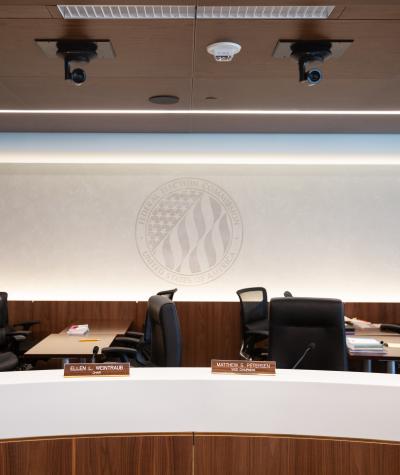Campaign Legal Center (CLC) has filed a lawsuit in District of Columbia federal court, challenging the Federal Election Commission’s (FEC) recent dismissal of an administrative complaint that CLC filed against the campaign committees of then-President Donald Trump in July 2020 and later supplemented in January 2021.
The underlying administrative complaint alleged that Trump’s 2020 campaign violated federal campaign finance transparency requirements by funneling hundreds of millions of dollars in payments to campaign staff and vendors through firms affiliated with the campaign, thereby hiding the details of those payments from the public.
The FEC is the only government agency whose sole responsibility is overseeing the integrity of our political campaigns. The FEC’s inability to do its job and properly investigate CLC’s allegations is just the latest example of the agency’s failures hindering voters’ right to know how political money is being spent.
In this case, the Trump campaign was able to keep voters in the dark regarding payments to several high-profile individuals, including the partners of his adult children.
CLC’s lawsuit, filed July 8, 2022, asks the court to declare that the FEC’s dismissal of the administrative complaint was unlawful.
Federal law requires candidates for federal office and their authorized campaign committees to disclose their spending, including the names of payees and the amount, date and purpose of each expenditure.
As the U.S. Supreme Court has explained, this disclosure serves a vital purpose: equipping voters with the knowledge necessary “to make informed decisions” when evaluating candidates and their messages. In short, voters have a right to real transparency about how money is being spent on elections and election influence.
The FEC has made clear that this reporting requirement applies even when a political committee routes the spending through another entity.
For example, a political committee must disclose information about the ultimate recipient of its spending if (1) the intermediary through which it routed that spending does not have an arm’s–length relationship with the committee or (2) the intermediary merely acted as a conduit for payments to the ultimate payee.
In other words, campaigns can’t circumvent reporting requirements by laundering payments through intermediaries. If campaigns could route all their spending through shell corporations or consulting firms, voters would be kept in the dark about that spending.
Drawing on a wealth of media reports and public records, CLC’s administrative complaint and subsequent supplement alleged that Trump’s 2020 presidential campaign (and an associated joint fundraising committee) violated these reporting requirements by funneling payments through two businesses.
These were American Made Media Consultants (AMMC), a corporation apparently created by Trump campaign officials, and Parscale Strategy, the consulting firm of former Trump campaign manager Brad Parscale.
The administrative filings first explained that neither AMMC nor Parscale Strategy had an arm’s-length relationship with the campaign. Media reports establish that campaign officials — including Trump’s son-in-law, Jared Kushner — oversaw AMMC’s founding and corporate governance. Parscale Strategy, meanwhile, was run by Trump’s campaign manager.
In addition, CLC’s filings alleged that both AMMC and Parscale Strategy functioned as conduits through which the campaign paid vendors and staff that were working for the campaign. Parscale Strategy, for example, reportedly paid the salaries of several campaign officials, including Kimberly Guilfoyle, the girlfriend of Donald Trump Jr., and Lara Trump, the wife of Eric Trump.
But rather than disclosing these payments on their FEC reports as the law requires by itemizing the subvendor payments made through AMMC and Parscale Strategy, the campaign reported only un-itemized bulk payments to the two firms.
Seeking to remedy these large-scale violations of transparency requirements, CLC filed its administrative complaint with the FEC — which has a mandate to enforce federal campaign finance law — in July 2020 and supplemented the complaint with additional information in January 2021.
Both filings alleged that the Trump campaign had violated federal disclosure requirements and asked the FEC to investigate the alleged violations and seek appropriate sanctions to deter future abuse of federal transparency laws.
These allegations — which involve brazen violations of critical transparency requirements and drew widespread public interest — warranted prompt investigation by the FEC. But the agency failed to act on CLC’s complaint for nearly two years, forcing CLC to sue the Commission to prompt it to consider CLC’s allegations.
The FEC’s nonpartisan Office of General Counsel subsequently recommended that the agency investigate the matter.
But investigating an administrative complaint requires the affirmative support of four of the FEC’s six Commissioners, and three Commissioners refused to even investigate CLC’s allegations, based on erroneous interpretations of law and FEC precedent and arbitrary disregard for the factual record.
As CLC’s lawsuit explains, these Commissioners’ purported justifications for this decision do not stand up to legal scrutiny. CLC has therefore asked a court to intervene and invalidate the FEC’s unlawful dismissal of its complaint.
The FEC is the only government agency whose sole responsibility is overseeing the integrity of our political campaigns. The Trump campaign’s use of shell corporations deprived voters of key details about the campaign’s operations. Through this suit, CLC seeks to force the FEC to do its job and enforce voters’ right to know “where political campaign money comes from and how it is spent.”
